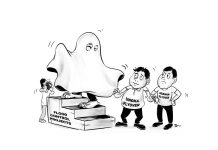
SEPTEMBER 21 is a wound in our history — the day Martial Law was declared in 1972, ushering in years of fear, abuse, and silenced dissent.
For decades, Filipinos have marked this day with marches and protests to remind the nation: never again. But this year, the anniversary carries a sharper sting. The ghosts of the past now walk alongside the anger of the present — outrage over corruption in flood control projects that have bled billions from the people’s money.
In Iloilo City, the connection between memory and grievance is impossible to ignore. Ilonggos who gathered in past September 21s to denounce dictatorship now also carry placards condemning “palpak” infrastructure — gyms left unfinished, school buildings reported “complete” but unsafe, and flood control projects that failed to control floods but succeeded in draining coffers. This is where the past meets the present: then and now, the abuse of power and betrayal of public trust fuel the people’s cry for justice.
The irony is striking. A Marcos once silenced dissent; today, another Marcos suspends the “no permit, no rally” rule, telling people they are free to march. Yes, the gesture opens space for protest — but does it open space for accountability?
Anger in the streets, after all, is not enough. What Ilonggos demand is action: a reckoning for those who profited while communities drowned.
This September 21 commemoration is a convergence — a reckoning of history and a confrontation with the present. The call of “never again” now rings not only against dictatorship but also against corruption that robs schools of classrooms, farmers of livelihood, and cities like Iloilo of real flood protection.
This day is goes beyond mere nostalgia or ritual. It is demanding accountability. If the past teaches us anything, it is that silence breeds impunity. Democracy cannot honor Martial Law’s victims if it turns a blind eye to today’s scandals.
So as Ilonggos take to the streets this September 21, they do so with a dual cry: never again to dictatorship, never again to corruption. History and present outrage march side by side. And unless those in power finally answer, the streets will remain the people’s court — where truth and justice are loudly demanded.







